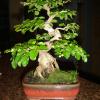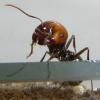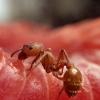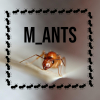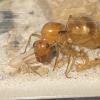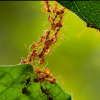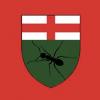A Work in Progress
This guide is a summary of the factors affecting ant and human health that I've gained from observations of my ant colonies and the suggestions and comments given by the contributors to this thread.
I've tried to write this guide in general terms that apply to ants and ant keeping, no matter what the species. It would be great if others could fill in the details that apply to individual species. Links would be a good way to do this. Please also supply a brief overview of the subject matter of the link.
Serafine has written a guide about ant health issues that can be found at antkeeping guide - ant health issues - General Ant Keeping - Ants & Myrmecology Forum (formiculture.com)
Ant Keeping Health Care Guide
Cleanliness and Sanitation
Cleanliness and sanitation are the cornerstones upon which these recommendations are based. Bacteria, viruses and fungi are ever present in our environment. To start with, keep your ant keeping area clean and tidy. Your hands should be washed and cleaned before tending to ants. Gloves can also be worn. For healthy colonies, instruments can be cleaned with a disinfectant like rubbing alcohol (70 % isopropyl alcohol USP). Flaming, heating or boiling can also be used to sterilize. Washing utensils and feeding trays in hot soapy water, then rinsing and drying, is usually sufficient to eliminate most pathogens.
Separate implements should be used for each colony or if the same implements are being used to feed all your ants, they should be disinfected between colonies. Dead ants and waste should be removed as soon as possible and not allowed to accumulate where molds and mites might grow. To avoid cross contamination, separate tools should be used for the removal of waste and the handling of ant foods.
Be aware that bacteria, viruses and molds can be airborne and can be inhaled by the ant keeper while using an aspirator/pooter to clean up waste. An industrial filter should be used to reduce this potential, or better yet, attach a vacuum cleaner to the aspirator or use the vacuum alone. Small vacuums used to clean computers work well for this. Tweezers and/or brushes can often be used safely for spot cleanup of waste and garbage.
Be aware that chemicals produced by some ants i.e., formic acid, can be inhaled through an aspirator which is hazardous for your lungs and is not recommended. Ants can bite and many species of ants can sting. Allergies to either may be a concern for the ant keeper.
Food Safety
All food presented to ants should be free from harmful pathogens. This can be done by boiling insects for three seconds or by using human or pet foodstuffs which are known to be disease free. Boiling will also ensure that insects used for ant food are free from mites and mite eggs. Feed only organic honey and fruit, or ones that you know are free from pesticides.
Offer your ants a wide variety of foods and insects and provide them with all the protein, carbohydrates and fats that they require. Don’t overfeed as uneaten food promotes mold growth and mite infestation. Feeding your ants pet food and human food can provide the vitamins, minerals and micronutrients that aren’t supplied by insects. Reptile supplements can also be used for the same purpose. Fruit offered to your ants can also provide minerals and vitamins.
Be aware that household insecticides, i.e. fly sprays, can also kill your ants. Flea and tick collars or powders on pets may also be a source of insecticide that will kill your ants. Wash your hands after handling your treated pet, before tending your ants. Also, be aware that loose fur from a treated pet can contain insecticide. insects captured in your home and outside may have been exposed to chemicals hazardous to your ants. Only collect feeder insects from areas where you know chemicals have not been used and that you know are safe.
It's been reported that some ant species, ie Camponotus require urea which may be supplied by bird droppings or urea fertilizer. Tree (pine) sap has also been reported to be important to some species to produce bactericides and fungicides. These needs may not have been clinically proven but seem possible based on observation.
Sugar/water and water
Sugar/water and water should always be available and changed regularly. Sugar/water is usually mixed in a ratio of three parts water to one part sugar, by volume. Liquid in feeders should be refreshed when empty or every three days and feeders should be replaced every seven days. Sugar/water should be refrigerated until used.
Fresh water should be constantly supplied, provide extra when you’re on vacation. Care should be taken not to flood ants as they can drown.
Ventilation, Heat and Humidity
Temperature, hydration and humidity in the formicarium are important and should satisfy the needs of the species you’re keeping. Ant rooms tend to be well sealed to prevent escapes and as a result have little air movement. A small fan can be used to increase air movement in the ant keeping area which helps ventilation and prevents mold growth.
Care should be taken to avoid overheating ants. This has occurred by leaving them in a sunny window for too long, leaving them in a closed vehicle in the sun, overheating them on a plant germination mat or by leaving them in a mailbox on a hot sunny day.
Be cautious when using glues and caulking as some produce toxic fumes that will kill ants.
Moving and Handling Ants Safely
Moving ants safely from one area to another can be accomplished in a number of ways. They can be gently "dumped" from a test tube into a formicarium. They can be coaxed to move into a new nest by keeping it dark while they're being encouraged to move from the old nest by lighting it brightly with white or UV light. Ants will often simply move from one nest to another, given enough time and incentive.
Ants can be captured with an aspirator (avoid formic acid) or picked up with a Size 20 flat paint brush and moved. Soft or featherweight tweezers can be used to gently pick them up. A licked finger will often pick up a renegade ant. Gently blowing on ants trying to escape while feeding will often make them retreat or freeze.
Containment of ants can be accomplished by minimizing the size of openings, using tight fitting joints and lids and appropriately sized screens, and the use of barriers like petroleum jelly, vegetable or mineral oil, talcum or baby powder, or fluon. Formicaria should also be designed to keep pests like other ants and mites out.
Access to ant keeping areas should be out of bounds to other pets like inquisitive cats, dogs with large wagging tails and unsupervised young children. Handle test tubes and ants with care over a table or bench. They're less likely to fall on the floor when you drop them, and you will drop them. When you do, be careful as broken test tubes are sharp and will cut you.
Diapause
Diapause is a winter rest period that's important for the long-term health of some ant species living in cold areas. An adequate rest period, at the right temperature and humidity for the species, should be provided.
Be aware that freezing will kill most ants.
Isolating New and Sick Colonies
New colonies should be isolated from others until you are sure they are disease and pest free. Isolation might also be a wise preventative measure for any colonies brood boosted with wild pupae.
Every effort should be made to reduce the possibility of mite infestation. Mites can be carriers of disease, and a mite infestation is often reported before a colony collapse. Boiling insects will eliminate mites and their eggs, but mites can also migrate into a colony or be brought in by other ants, in soil, moss, or possibly on brood used for boosting. Isolate any infected colony immediately at a safe distance that mites cannot migrate to other colonies. Predatory mites are available that can be used to eliminate trash mites.
Any colony exhibiting disease symptoms should be removed to an area with a separate air supply to prevent mold spores from spreading. Quickly disposing of dead ants and waste from infected colonies into a covered container will also help prevent the spread of mold spores. To prevent reinfection, reused formicaria, tubing, feeders etc. should be sterilized with boiling water or disinfectant or simply disposed of.
Separate implements, food, sugar/water and water should be used to feed infected colonies. For infected colonies, a stronger disinfectant for utensils may be necessary which will kill bacteria, viruses and fungi. These are available from pharmacies and veterinarians. Care must be taken as these chemicals are toxic, so gloves and masks are recommended. Follow all other safety precautions. Take care as strong disinfectants may damage plastic, vinyl, and brushes. These disinfectants and their fumes can also be toxic to your ants, so minimize their exposure.
Beware of Ultraviolet (UV) Hazard
UV light is often used to attract mating ants and is called blacklighting. Numerous warnings about the hazards of UV light exist on the internet but a good summary is located here https://www.hornerli...y-Factsheet.pdf
UV light can cause short and long-term damage, particularly to eyes. It isn't safe to look directly into UV light. Short term exposure risks things like welders' eye whereas long-term effects are many including cataracts. Wear UV filter sunglasses when working around an unprotected light. Keep bulbs covered or protected from direct sight.
UV bulbs produce ozone and other dangerous compounds. When confined in a small space those gases are concentrated and are unsafe to breath, so provide ventilation and be aware. UV bulbs that contain mercury are disposed of as hazardous waste.
Record keeping
Records can be kept for each colony to evaluate the advances or declines of each and monitor any significant changes. Dates of major events should be noted, i.e., date queen found, date of first eggs, larvae, pupae and workers, beginning and end of diapause etc. Changes in feeding behavior or brood development should be recorded for future reference.
Well, that’s what I’ve got so far. Please feel free to correct, update, provide links or otherwise improve the information in the Health Guide as much as possible. An informative Health Guide will be of benefit to all ant keepers. I appreciate your assistance.
RPT
Edited by rptraut, January 13 2025 - 1:57 AM.


